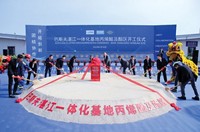Advertisement
Grab your lab coat. Let's get started
Welcome!
Welcome!
Create an account below to get 6 C&EN articles per month, receive newsletters and more - all free.
It seems this is your first time logging in online. Please enter the following information to continue.
As an ACS member you automatically get access to this site. All we need is few more details to create your reading experience.
Not you? Sign in with a different account.
Not you? Sign in with a different account.
ERROR 1
ERROR 1
ERROR 2
ERROR 2
ERROR 2
ERROR 2
ERROR 2
Password and Confirm password must match.
If you have an ACS member number, please enter it here so we can link this account to your membership. (optional)
ERROR 2
ACS values your privacy. By submitting your information, you are gaining access to C&EN and subscribing to our weekly newsletter. We use the information you provide to make your reading experience better, and we will never sell your data to third party members.
Business
BASF to pull out of venture in China’s Xinjiang region
Firm faces pressure over ties to Uyghur human rights abuses
by Alexander H. Tullo
February 9, 2024

BASF says it is seeking to divest its stake in two controversial manufacturing joint ventures in Korla, China. The German chemical giant is facing mounting pressure over its partner’s alleged involvement in human rights abuses against the Uyghur minority in China’s Xinjiang region, where the plants are located.
The joint venture plants, with local partner Xinjiang Markor Chemical Industry, were completed in 2016. They produce butanediol and the derivative polytetrahydrofuran, a raw material for elastic fibers such as spandex.

An investigation by the German news outlets Der Spiegel and ZDF found that Xinjiang Markor employees accompanied Chinese officials on visits to Uyghur homes. Human Rights Watch says such visits, which can last more than 5 days, are meant to spy on and indoctrinate Uyghur families.
Spurred by the reports, the Inter-Parliamentary Alliance on China, an international organization of lawmakers, called on BASF to withdraw from the ventures in a letter to its chairman, Martin Brudermüller. “The reports indicate the shocking degree to which your company appears to be implicated in gross abuses of the Uyghur and other predominantly Turkic minorities in the region,” the letter says.
BASF denies involvement in the abuses, noting that the reports cite its partner, Xinjiang Markor. “We currently have no reason to believe that employees from our joint ventures were involved in the measures described,” BASF says in a statement about the Der Spiegel and ZDF article. It also says its audits of the partnerships, which employ about 120 people, have found no “evidence of forced labor or other human rights violations.”
In a Feb. 9 announcement, BASF says it has been seeking to divest its shares in the ventures since the fourth quarter of last year. It primarily cites economic and environmental reasons. It says the butanediol market faces increased competitive pressure due to overcapacity. Also, because the butanediol produced in Korla is derived from coal, it has a “significantly higher” product carbon footprint than that made in BASF’s other butanediol plants.
BASF also says the article about the Uyghur human rights violations will accelerate the divestment process. “Recently published reports related to the joint venture partner contain serious allegations that indicate activities inconsistent with BASF’s values,” the firm says in its statement.
In a press release, the Inter-Parliamentary Alliance on China says Brudermüller held a conference call with its members on Feb. 9 in which he pledged to withdraw from the ventures “within months” because a “‘red line’ had been crossed that was not compatible with company ethos.”
In that statement, UK Member of Parliament Iain Duncan Smith says he welcomes the BASF announcement and notes that other companies, such as Volkswagen, have more extensive operations in the region.
BASF says its presence in China is otherwise unchanged. Indeed, the firm’s relationship with China has been deepening. In addition to existing plants and partnerships around the country, it started construction in 2019 on a more than $10 billion integrated chemical project in Zhanjiang, China, that will become a major global manufacturing hub for the company.




Join the conversation
Contact the reporter
Submit a Letter to the Editor for publication
Engage with us on Twitter